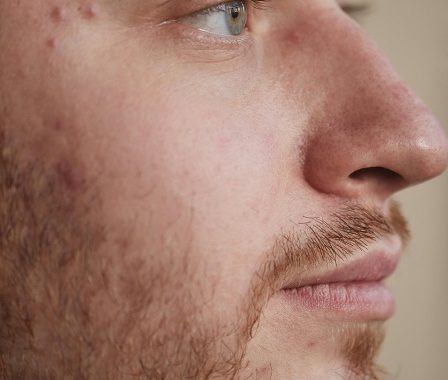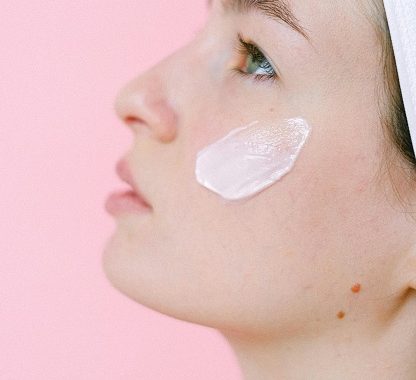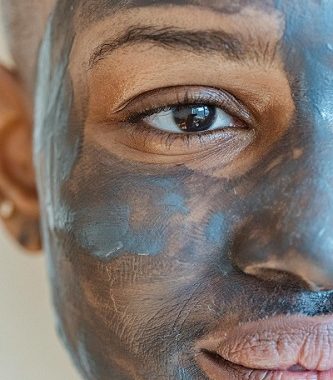
Hormonal acne, a persistent and often frustrating skin condition, affects individuals of all ages, but it can be particularly challenging for adults. Characterized by deep, cystic pimples, typically along the jawline, chin, and cheeks, hormonal acne is triggered by fluctuations in hormone levels, particularly androgens like testosterone and estrogen.
While it can seem like an insurmountable battle, there are effective strategies and treatments available to combat hormonal acne and achieve clear, radiant skin.
Understanding Hormonal Acne:
Hormonal acne arises from the intricate interplay of hormonal fluctuations and skin physiology.
During puberty, increased androgen levels stimulate sebaceous gland activity, leading to excess oil production and clogged pores. Similarly, fluctuations in estrogen and progesterone levels during menstruation and pregnancy can disrupt the skin’s delicate balance, promoting acne development.
Menopause brings about hormonal shifts, triggering acne in some individuals. Stress, genetics, and medications like corticosteroids or hormonal contraceptives can exacerbate hormonal imbalances, intensifying acne severity.
Understanding these multifaceted triggers is crucial for tailoring effective treatment approaches that address the root causes of hormonal acne, ultimately leading to clearer, healthier skin.
�
Best Hormonal Acne Treatments:
- Topical Retinoids: Dermatologist-recommended and highly effective, topical retinoids like tretinoin can regulate cell turnover, unclog pores, and reduce inflammation, thereby preventing acne breakouts and promoting clear skin.
- Oral Contraceptives: For women experiencing hormonal acne related to menstrual cycles, oral contraceptives containing estrogen and progestin can help regulate hormone levels and minimize acne flare-ups.
- Spironolactone: This prescription medication, primarily used to treat high blood pressure, is also highly effective in managing hormonal acne by reducing androgen levels and decreasing oil production.
- Isotretinoin (Accutane): Reserved for severe cases of hormonal acne, isotretinoin is a potent oral medication that targets all aspects of acne formation, offering long-term remission in many patients.
Best Tea Tree Essential Oil by Fiora Naturals
Natural Home Remedies for Hormonal Acne:
In addition to medical interventions, several natural remedies can complement traditional treatments and promote clearer skin:
- Tea Tree Oil: With its anti-inflammatory and antimicrobial properties, tea tree oil can help reduce acne lesions and prevent bacterial growth when applied topically to affected areas.
- Apple Cider Vinegar: Diluted apple cider vinegar serves as a natural astringent, helping to balance skin pH, reduce oiliness, and unclog pores when used as a toner.
- Honey and Cinnamon Mask: A blend of raw honey and cinnamon powder can soothe inflamed skin, inhibit bacterial growth, and promote healing when applied as a face mask.
- Zinc Supplements: Zinc plays a crucial role in immune function and wound healing, and supplementation may help regulate hormone levels and reduce acne severity.
Apple Cider Vinegar Foam Exfoliating Face Wash & Brush
Dietary Strategies for Hormonal Acne:
Diet plays a significant role in overall skin health and can influence hormonal balance, potentially impacting acne symptoms.
While direct causal relationships between specific foods and acne remain inconclusive in scientific research, adopting a balanced diet centered on whole, nutrient-dense foods can provide essential vitamins, minerals, and antioxidants that support skin function and regeneration.
Incorporating ample fruits and vegetables rich in vitamins A, C, and E, along with antioxidants like beta-carotene and selenium, can help reduce inflammation, support collagen production, and protect against oxidative damage, promoting clearer skin.
Additionally, opting for lean proteins such as poultry, fish, legumes, and tofu provides essential amino acids necessary for skin repair and regeneration.
Furthermore, prioritizing healthy fats from sources like avocados, nuts, seeds, and olive oil can help maintain skin hydration, strengthen the skin barrier, and regulate sebum production.
Conversely, limiting intake of processed foods, refined carbohydrates, sugary snacks, and high-glycemic foods can help stabilize blood sugar levels, reducing insulin spikes that may contribute to hormonal fluctuations and acne development.
Some individuals may also find benefit in reducing dairy consumption, as certain dairy products contain hormones and growth factors that could potentially exacerbate acne symptoms in susceptible individuals.
By emphasizing whole, nutrient-rich foods and minimizing processed and inflammatory foods, individuals can support hormonal balance and promote clearer, healthier skin from within.
Organic Aloe Vera Gel for Face
Creating a Dermatologist-Recommended Skincare Routine:
A consistent skincare regimen tailored to address hormonal acne is essential for achieving and maintaining clear skin. Dermatologists often recommend the following steps:
-
Gentle Cleansing:
Gentle cleansing is a foundational step in any skincare routine, particularly for individuals dealing with hormonal acne. It involves using a mild, non-comedogenic cleanser twice daily, preferably in the morning and evening, to effectively remove impurities like dirt, excess oil, and makeup.
Non-comedogenic cleansers are formulated to prevent clogged pores, making them suitable for acne-prone skin. The key is to cleanse thoroughly without disrupting the skin’s natural moisture barrier, which can exacerbate acne symptoms.
By choosing a gentle cleanser, you can maintain a clean canvas without stripping away essential oils, ensuring that your skin remains balanced and hydrated. This sets the stage for subsequent skincare steps and allows other products to penetrate more effectively, maximizing their benefits in combating hormonal acne.
-
Exfoliation:
Exfoliation is a crucial step in any skincare routine, aiding in the removal of dead skin cells that can clog pores and contribute to acne formation.
By incorporating a gentle exfoliant containing salicylic acid or glycolic acid into your regimen 2-3 times per week, you can effectively unclog pores, promote cell turnover, and reveal smoother, brighter skin.
Salicylic acid penetrates deep into pores, dissolving excess oil and preventing future breakouts, while glycolic acid gently resurfaces the skin, diminishing the appearance of acne scars and hyperpigmentation.
However, it’s essential to avoid over-exfoliation, as this can strip the skin of its natural oils and lead to irritation. Always follow exfoliation with a moisturizer and sunscreen to protect and hydrate the skin, ensuring a balanced and healthy complexion.
-
Moisturization:
Moisturization is crucial in managing hormonal acne, especially when using drying treatments like retinoids or benzoyl peroxide. Opting for oil-free, non-comedogenic moisturizers ensures hydration without exacerbating acne by clogging pores.
These lightweight formulas are specifically designed to provide moisture to the skin without adding excess oil, which can contribute to acne breakouts. By maintaining proper hydration, the skin’s barrier function is strengthened, helping to prevent further irritation and inflammation.
Additionally, non-comedogenic moisturizers help balance the skin’s natural oil production, promoting a healthier complexion overall. Consistently incorporating a suitable moisturizer into your skincare routine can complement acne treatments and contribute to clearer, more comfortable skin.
-
Sun Protection:
Sun protection is paramount in managing hormonal acne. Daily application of a broad-spectrum sunscreen with an SPF of 30 or higher shields the skin from the damaging effects of UV radiation, which can exacerbate inflammation and trigger acne flare-ups.
Moreover, consistent sun protection helps prevent post-inflammatory hyperpigmentation, which can occur as acne lesions heal, by minimizing the risk of dark spots and uneven skin tone.
Broad-spectrum sunscreens offer protection against both UVA and UVB rays, ensuring comprehensive defense against premature aging and sun-induced skin damage.
Incorporating this crucial step into your skincare routine not only supports acne management but also promotes overall skin health and reduces the risk of long-term sun damage and skin cancer.
Conclusion:
While hormonal acne can be a persistent and frustrating condition, effective treatments and strategies are available to help manage symptoms and achieve clear, radiant skin.
Whether opting for medical interventions, natural remedies, dietary adjustments, or a combination thereof, consistency and patience are key to success.
By working closely with a dermatologist and adopting a comprehensive approach to skincare and wellness, individuals can regain confidence and enjoy a smoother, blemish-free complexion.
Further Reading:
Adult female acne: a guide to clinical practice
25 Skincare Products Reviewers With Hormonal Acne Swear
FAQs:
What treatment is best for hormonal acne?
The best treatment for hormonal acne typically involves a combination of topical retinoids, oral contraceptives (for women), and medications like spironolactone or isotretinoin in severe cases. These options work to regulate hormone levels, reduce oil production, and prevent inflammation, effectively targeting the underlying causes of hormonal acne. Additionally, establishing a consistent skincare routine, incorporating natural remedies, and maintaining a balanced diet can complement medical interventions and promote clearer skin. Consulting with a dermatologist is crucial for personalized treatment recommendations tailored to individual needs and severity of acne.
�
Can hormonal acne be fixed?
Yes, hormonal acne can be effectively managed through various treatments such as topical retinoids, oral contraceptives, spironolactone, and isotretinoin. Additionally, natural remedies and lifestyle changes like a balanced diet, proper skincare routine, and sun protection can complement medical interventions. While complete “fixing” may vary from person to person, consistent management strategies can significantly reduce acne severity and frequency, leading to clearer and healthier skin. Consulting with a dermatologist can provide personalized guidance and treatment options tailored to individual needs.
�
What cream is best for hormonal acne?
For hormonal acne, creams containing retinoids like tretinoin are often recommended by dermatologists. These creams regulate cell turnover, unclog pores, and reduce inflammation, effectively targeting hormonal acne at its root. Additionally, creams containing benzoyl peroxide or salicylic acid can help to combat acne-causing bacteria and exfoliate the skin, promoting clearer complexion. However, it’s essential to consult with a dermatologist to determine the most suitable treatment based on individual skin needs and concerns.
�
What are the top 3 best acne treatments?
The top three best acne treatments are topical retinoids like tretinoin, oral contraceptives containing estrogen and progestin for hormonal acne in women, and oral medication spironolactone, particularly effective for hormonal acne by reducing androgen levels and oil production. These treatments target different aspects of acne formation, including regulating cell turnover, hormone levels, and oil production, providing comprehensive solutions for managing acne breakouts effectively.



